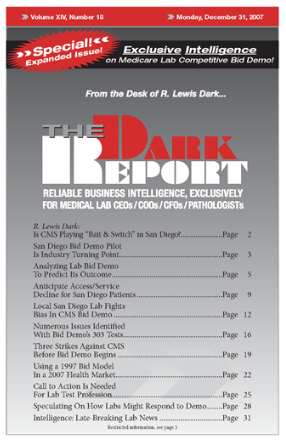CEO SUMMARY: Statements and actions by CMS officials responsible for the laboratory competitive bidding demonstration project reveal the likelihood that they are using it as a Trojan Horse. While talking about implementation of a three-year demonstration project in the San Diego MSA, CMS dropped hints that it will use the bids submitted on February 15 …
Speculating On How Labs Might Respond to Demo Read More »
To access this post, you must purchase The Dark Report.


